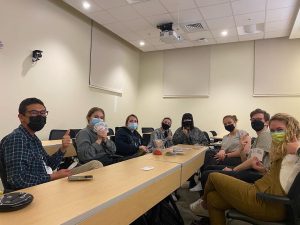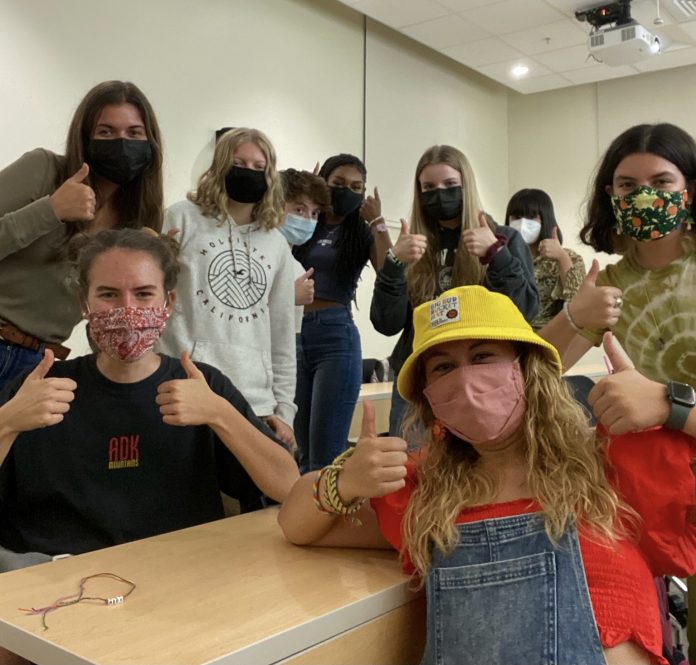Scrolling through the Instagram page of the College of William and Mary’s new club, the Veggie Society, you will find a mix of the usual club posts sprinkled with idiosyncratic pictures of fresh produce and candid shots of the founders.
As the organization’s name suggests, Veggie Society is a club that promotes plant-based eating and environmental consciousness among the student body. Founded by Caroline Leibowitz ’24, Megan Bisonette ‘24 and Sydney Thayer ‘24, the trio of vegetable enthusiasts formed the club when they realized no other organization connected people with similar interests.
“So we were in Caroline’s room, just sitting there. And we were like, we should start a vegan club,” Thayer said. “There are so many plant-based people here, and there are so many people interested in this, like why does William and Mary not already have this?”
Plant-based diets have been on the rise for many years. A 2019 survey conducted by the Harris Poll estimated that 14% of college students are vegan, vegetarian, or proscribe to a plant-based diet. The College has updated its menus to reflect this trend, yet the plant-based options remain much to be desired.
“I’ve been a lot happier this year in comparison to last year,” Bisonette said. “I definitely agree that there aren’t enough options and frankly, a lot of the options are undercooked yellow squash and zucchini together. It’s really hit or miss sometimes.”
Although Dining Services boasts an A+ vegan report card issued by PETA, the trio felt that they still fall short.
“I remember last year, there was a Thanksgiving-themed meal, but there was no vegetarian station,” Leibowitz said. “…I got a wrap, and it had lettuce, tomato, onions and vinaigrette. It was terrible. That was probably the most disappointing thing I’ve experienced on campus as someone who has those dietary restrictions.”
But when there are tasty options, they all agree that the instances are too sporadic.
“The inconsistency of the vegan options is the most frustrating thing,” Thayer said. “There are really good days — like they sometimes have these really good vegan cookies.”
Creating the Veggie Society was more than a joke-turned-achievement: the founders aimed to alleviate the disappointment by creating a space where like-minded people could socialize and learn from each other.
“Our whole purpose is to be a community for people who are interested in plant-based eating and to further ideas related to mental, physical and environmental wellness,” Bisonette said.
“Our whole purpose is to be a community for people who are interested in plant-based eating and to further ideas related to mental, physical and environmental wellness,” Bisonette said.
Though nervous about turnout and how they would be perceived at their first meeting, the founders quickly realized that there was strong enthusiasm for the Veggie Society on campus.
“We were so pleased with how excited everyone was that they were there,” Thayer said. “You can tell that everyone is having a good time, and people talk to each other, and our whole thing is community building and that clearly happens at all of our meetings.”
Membership is not limited to strict vegetarians or vegans. Veggie Society does not judge people’s eating behavior or shame people for eating meat. In fact, they promote the very opposite: the club welcomes contributions from anyone in the community.
“Someone once asked me why we had a banana on the table at the Activities Fair,” Thayer said. “They were like, ‘it’s Veggie Society and that’s a fruit.’ I was like, well, we’re inclusive.”
Exclusivity would also inspire misconceptions about the club’s mission, Thayer continued.
“There’s a certain connotation that comes with being vegan and a lot of privilege and elitist ideals that you have to do it perfectly,” Thayer said. “We really want to make it so that it’s like a fun space, and no one feels excluded.”
Reflecting their ethos, Veggie Society’s bi-weekly meetings are a mix of hands-on activities and games for everyone to relax.
“I would say the main way our meetings run, they’re very chill, very low-key,” Bisonette said. “Some of the things we like doing are making crafts and friendship bracelets. We’ve watched vegan documentaries, we had a meeting specifically dedicated to coming up with action plans of things that we could do to try to advocate for more vegan options.”

Despite having only a semester under their belt, the organizers are ecstatic about the future and the activities they will hold.
“We have a whole list of things that we’re working on,” Thayer said. “We were just getting on our feet last semester, so this semester, we want to do club trips to the Williamsburg Farmers Market, have hikes on the weekends and trash clean-ups and then we have this really epic idea, Veggies and Sprouts–kind of like the Veggie Society version of Bigs and Littles.”
In fact, Veggie Society is known not only among students, but also fell on the Admission Office’s radar.
“I became a tour guide recently, and we get mentioned in the admission officers’ spiel that they give to prospective students,” Thayer said. “They are just like, ‘we even have a Veggie Society on campus,’ like to show how cool and quirky William and Mary is.”
Although the club itself emphasizes fun and relaxation, the founders are committed to practicing sustainability in their daily lives and hope that more students will make a conscious effort to as well.
“This year, DuPont didn’t come with a recycling bin, so we bought our own. It says ‘hot girls compost and recycle,’ and we have a compost bin,” Bisonette said. “William and Mary has a lot of ways that you can be sustainable, and we have a lot of programs that enable it. So I think the biggest thing is just to be more conscious of your activities and the impact that they’re making.”
Connecting her class materials to sustainable living, Thayer added that being more intentional about how we dispose of our waste could have greater impacts than we imagine.
“I took a class called the History of Garbage, and one of our assignments in that class was to track all of our waste for one week,” Thayer said. “I think waste management is one of the biggest things that, like, you don’t even realize how much you throw away until you are forced to write down all the things that you throw away and where they go. And so much of that can be avoided if you think about it a little bit more.”
Ultimately, Veggie Society’s presence is to promote healthy living and mindfulness, no matter where you are in your sustainability journey.
“If you love your veggies, come join us. And if you’re not fully vegan, you should be eating vegetables every day. Eat your veggies, and take care of your brain,” Leibowitz said.

